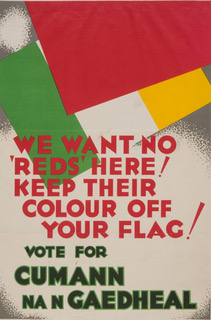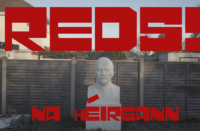Students of the coup d’état of 1922 will be interested in the following letter, which appeared in the Freeman’s Journal of 5 August 1922 under the headline “Irregulars’ Eager Allies | Policy of the Communist Party of Ireland.”
The following excerpts from The Workers’ Republic of 28th July—the “official organ of the Communist Party of Ireland (an organ of the Third International)”—should enlighten the people of Ireland as to the sinister forces rallying to the help of the Irregulars in the attempt to defy the Irish people’s Government—“The Labour Party, supported by the Communist Party, backing the Republicans and appealing to the people with a proper social programme, will be absolutely invincible. The programme would be based upon the present needs of the masses, comprising confiscation of the land, the big estates and ranches to become the property of the landless peasants; social ownership of creameries, etc.; confiscation of all heavy industries, banks, etc.; repudiation of all debts, and the controlling and running of industry, land and housing to be in the hands of councils elected by the workers and peasants.
“Republicans, here is your chance; with the workers behind you the Free State, relapses into the black hell from whence it came.
“Everything is in a whirl, war, ambushes, raids, searches, attack and defence everywhere. Amidst it all the Communist Party has two duties to perform: First, to maintain its own forces intact, to increase their power and influence, and keep prepared for all emergencies. Second, to do all we can in every possible way to assist the Republicans against the Free State, to show them how they can win, to attract the workers and peasants to their side to aid them in their struggle, to prove to them that only with this aid is victory possible for their cause.
“Remember you are the Red Guards of Communism in Ireland. And be assured of this—your brothers in the British Party are watching your struggles, ready and anxious to help in every way they can—the whole international movement looking upon the fights of the valiant little Irish section with admiration, the whole Communist International is rallying all its forces to our assistance, directly and indirectly in every way it can.”
This is a succinct contemporary statement of the CPI position in 1922. Unfortunately, it had no influence whatsoever on the Labour Party and very limited influence on the leadership of the republican resistance.
The letter-writer comments:
So that is the plan—make Ireland the cockpit for the bloody revolutionist schemes of the Nihilists, Bolshevists and cunning Communists of England and the Continent of Europe!
“Create social discontent and hasten the bloody revolution” is the motto of the Communists. But they won’t try that game in England—oh no! “Seize factories”—yes, In Ireland, thiggin thu? [sic!] Burn down factories, blow up bridges, destroy creameries, smash up railways—do all you can to make Ireland a hell, a blackened, bankrupt land of desolation, with the blood of its citizens flooding the ashes of their homesteads—and then salute the foul idol of Anarchy set up by the Communists and Bolshevists.
What a glorious dream for the dupes of The Workers’ Republic!—and what a significant compliment to Mr. de Valera and his Irregulars to be patted on the back by such thugs. “To do all we can to assist the Irregulars”—quite so, and the Irregulars are showing by their mad policy and criminally destructive methods and tactics that they are congenial comrades for Communist-Bolshevist allies. It must be the new way to “show the world the might of moral booty.”
The letter continues:
This “Official Organ of the Communist Party of Ireland” is so consistent in its international sympathies that it bears the imprint of a London printing firm—possibly to help to make Irish workers discontented by boycotting the Irish printing trade—it is printed by C. W. Long. Printer (T.U.), 104, Dawes road, London, S.W.6.
(It wasn’t the CPI that boycotted the Irish printing trade. It was the other way around. The party could not get a printer in Ireland for its paper.)
The same letter was published in the Wicklow People of 12 August 1922 under the heading “Hellish advice.” It was signed by “Peadar Mac-h-Uibhir, Dublin.” It is hard not to suspect that it may have been concocted on a letter-writing table in a propaganda nest in Dublin Castle or Portobello Barracks. The letter shows two aspects of the Free Stater mindset: the need to blacken the republicans by playing on the prejudices of a growing anti-communism and, deeper still, the “nightmare” evoked by popular support for socialism.






